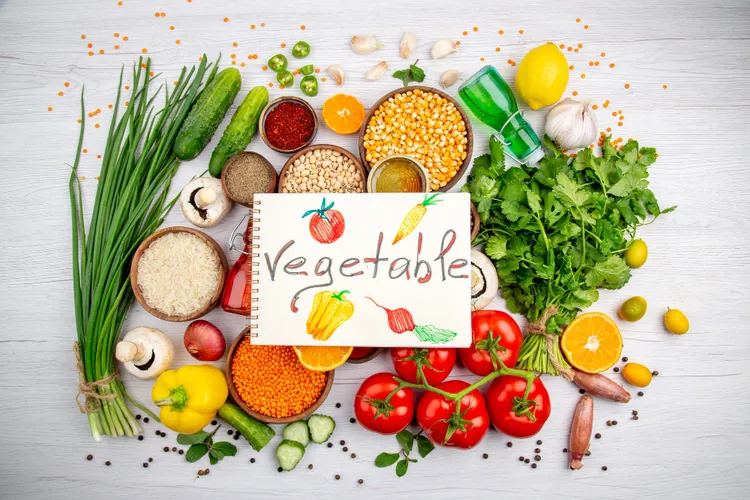What People Need to Know About a Vegetarian Diet
The vegetarian diet has surged in popularity in recent years, driven by concerns about health, environmental sustainability, animal welfare, and ethical considerations. Whether you're considering going vegetarian for a week, a month, or a lifetime, understanding the ins and outs of this dietary choice is crucial for making informed decisions.

What Is a Vegetarian Diet?
A vegetarian diet excludes meat, poultry, fish, and other animal flesh but typically includes plant-based foods such as fruits, vegetables, grains, legumes, nuts, and seeds. However, vegetarianism isn’t a one-size-fits-all approach. There are several variations, each with its own rules:
- Lacto-ovo vegetarian: Includes dairy products (lacto) and eggs (ovo) but no meat or fish.
- Lacto-vegetarian: Includes dairy but excludes eggs, meat, and fish.
- Ovo-vegetarian: Includes eggs but excludes dairy, meat, and fish.
- Vegan: Excludes all animal products, including dairy, eggs, honey, and gelatin.
- Pescatarian: Includes fish and seafood but excludes other meats (not always considered "true" vegetarianism).
- Flexitarian: Primarily vegetarian but occasionally includes meat or fish.
Each type caters to different preferences, ethical beliefs, or health goals. For this post, we’ll focus on the broader vegetarian framework (primarily lacto-ovo vegetarianism) while addressing considerations that apply across variations.
Why Choose a Vegetarian Diet?
People adopt vegetarian diets for a variety of reasons, each backed by compelling evidence. Here are the primary motivations:
- Health Benefits
Research consistently links vegetarian diets to improved health outcomes. According to a 2019 study in The Lancet, plant-based diets are associated with lower risks of chronic diseases, including:
- Heart Disease: Vegetarian diets are typically lower in saturated fats and cholesterol, reducing the risk of cardiovascular issues. A 2013 study in JAMA Internal Medicine found that vegetarians have a 32% lower risk of heart disease compared to non-vegetarians.
- Type 2 Diabetes: Plant-based diets, rich in fiber and low in processed sugars, improve blood sugar control. The Adventist Health Study-2 showed a 50% lower risk of type 2 diabetes among vegetarians.
- Certain Cancers: Diets high in fruits, vegetables, and whole grains are linked to lower risks of colorectal and other cancers, per the World Health Organization (WHO).
- Weight Management: Vegetarians tend to have lower body mass indexes (BMIs) due to the high-fiber, low-calorie nature of plant-based foods.
- Environmental Impact
Animal agriculture is a significant contributor to greenhouse gas emissions, deforestation, and water usage. A 2018 study in Science found that shifting to a vegetarian diet could reduce an individual’s carbon footprint by up to 50%. Plant-based diets require less land and water, making them a sustainable choice in the face of climate change.
- Ethical and Animal Welfare Concerns
Many people choose vegetarianism to avoid contributing to animal suffering. Industrial farming practices often involve cramped conditions, inhumane treatment, and slaughter, prompting individuals to opt for a diet aligned with compassion for animals.
- Economic and Accessibility Benefits
Plant-based staples like beans, rice, lentils, and seasonal vegetables are often more affordable than meat, making vegetarianism a cost-effective choice, especially in regions where fresh produce is abundant.
Key Nutritional Considerations for a Vegetarian Diet
While a vegetarian diet offers numerous benefits, it requires careful planning to ensure nutritional adequacy. Here are the critical nutrients to focus on and how to meet your needs:
- Protein
Contrary to popular belief, getting enough protein on a vegetarian diet is entirely achievable. Plant-based protein sources include:
- Legumes (lentils, chickpeas, black beans)
- Tofu, tempeh, and edamame
- Nuts and seeds (almonds, chia seeds, hemp seeds)
- Whole grains (quinoa, farro, brown rice)
- Dairy and eggs (for lacto-ovo vegetarians)
Daily Need: Adults need about 0.8 grams of protein per kilogram of body weight (e.g., 56 grams for a 70-kg person). Combining different protein sources (e.g., rice and beans) ensures a complete amino acid profile.
- Iron
Iron is essential for oxygen transport and energy production. Plant-based (non-heme) iron is less bioavailable than animal-based (heme) iron, so vegetarians need to consume more. Sources include:
- Leafy greens (spinach, kale)
- Lentils, chickpeas, and fortified cereals
- Pumpkin seeds and tofu
Tip: Pair iron-rich foods with vitamin C sources (e.g., bell peppers, citrus fruits) to enhance absorption. Avoid consuming tea or coffee with iron-rich meals, as they can inhibit absorption.
Daily Need: Adult women need 18 mg/day, men need 8 mg/day, but vegetarians may require 1.8 times more due to lower bioavailability.
- Vitamin B12
Vitamin B12, crucial for nerve function and blood cell formation, is primarily found in animal products. Vegetarians who consume dairy or eggs can get B12 from these sources, but vegans need fortified foods or supplements. Sources include:
- Fortified plant milks and cereals
- Nutritional yeast
- Eggs and dairy (for lacto-ovo vegetarians)
Daily Need: 2.4 mcg for adults. Regular blood tests can help monitor B12 levels.
- Calcium
Calcium supports bone health and muscle function. Vegetarians can meet needs through:
- Dairy products (milk, yogurt, cheese)
- Fortified plant milks (almond, soy, oat)
- Leafy greens (kale, bok choy)
- Tofu and almonds
Daily Need: 1,000–1,200 mg for adults.
- Omega-3 Fatty Acids
Omega-3s support heart and brain health but are less abundant in vegetarian diets, as they’re primarily found in fish. Plant-based sources include:
- Flaxseeds, chia seeds, and hemp seeds
- Walnuts
- Algae-based supplements (a direct source of DHA and EPA)
Tip: Grind flaxseeds for better absorption and aim for 1–2 tablespoons daily.
- Zinc
Zinc supports immunity and metabolism but is less bioavailable in plant foods due to phytates. Sources include:
- Pumpkin seeds, cashews, and chickpeas
- Whole grains and fortified cereals
- Dairy products
Daily Need: 8–11 mg for adults. Soaking or sprouting grains and legumes can improve zinc absorption.
- Vitamin D
Vitamin D, important for bone health and immunity, is found in few foods. Vegetarians can get it from:
- Sun exposure (15–30 minutes daily, depending on skin tone and location)
- Fortified dairy or plant milks
- Egg yolks
- Supplements (especially in winter or low-sunlight regions)
Daily Need: 600–800 IU for adults.
Benefits of a Vegetarian Diet
Beyond the health and environmental advantages mentioned earlier, a vegetarian diet offers additional perks:
- Increased Fiber Intake: Plant-based diets are naturally high in fiber, promoting digestive health, satiety, and stable blood sugar.
- Diverse Flavors and Creativity: Vegetarianism encourages experimentation with global cuisines (e.g., Indian curries, Mediterranean hummus, or Mexican bean tacos), expanding culinary horizons.
- Improved Energy Levels: Many vegetarians report feeling more energized due to nutrient-dense foods and lower intake of heavy, processed meats.
- Community and Support: The growing vegetarian movement offers online communities, cookbooks, and restaurants catering to plant-based eaters.
Challenges of a Vegetarian Diet and How to Overcome Them
While rewarding, a vegetarian diet comes with challenges that require planning:
- Nutrient Deficiencies: As noted, deficiencies in B12, iron, or omega-3s can occur without careful planning. Solution: Diversify your diet, use fortified foods, and consider supplements after consulting a healthcare provider.
- Social Situations: Dining out or attending social events can be tricky when options are meat-heavy. Solution: Research menus in advance, bring a vegetarian dish to share, or communicate dietary needs to hosts.
- Convenience: Vegetarian options may be limited in some areas, especially fast food settings. Solution: Keep portable snacks like nuts or protein bars on hand and seek out vegetarian-friendly chains or apps like HappyCow to find restaurants.
- Cravings for Meat: Some new vegetarians miss the taste or texture of meat. Solution: Try plant-based meat alternatives (e.g., Beyond Meat, Impossible Foods) or recipes that mimic meaty flavors, like mushroom-based dishes.
- Cost of Specialty Products: Vegan cheeses or meat substitutes can be pricey. Solution: Focus on affordable staples like beans, rice, and seasonal produce, and limit processed alternatives.
Practical Tips for Thriving on a Vegetarian Diet
- Start Gradually: If transitioning, begin with “Meatless Mondays” or swap one meal a day for vegetarian options to ease into the lifestyle.
- Meal Prep: Plan weekly meals to ensure variety and nutrient balance. Batch-cook dishes like lentil soup or veggie stir-fries for convenience.
- Explore Global Cuisines: Draw inspiration from vegetarian-friendly cultures, such as Indian (dal, paneer), Mediterranean (falafel, tabbouleh), or Ethiopian (lentil stews).
- Read Labels: Check nutrition facts and ingredient lists for hidden animal products (e.g., gelatin in candies) and to ensure adequate nutrients in processed foods.
- Consult Experts: Work with a dietitian to tailor your diet, especially if you have specific health conditions or are pregnant, breastfeeding, or raising vegetarian children.
- Join a Community: Connect with vegetarian groups online or locally for recipes, tips, and moral support.
Common Myths About Vegetarian Diets
Myth 1: Vegetarians Can’t Get Enough Protein
- Truth: Plant-based sources like legumes, tofu, and nuts provide ample protein when consumed in variety. Most vegetarians easily meet protein needs.
Myth 2: Vegetarian Diets Are Expensive
- Truth: Staples like beans, rice, and seasonal vegetables are budget-friendly. Expensive meat substitutes are optional, not essential.
Myth 3: Vegetarian Diets Are Boring
- Truth: With countless plant-based ingredients and global recipes, vegetarian diets can be vibrant, flavorful, and diverse.
Myth 4: You’ll Always Feel Hungry
- Truth: High-fiber foods like whole grains and vegetables promote satiety. Proper meal planning ensures you feel full and satisfied.
Myth 5: Vegetarian Diets Aren’t Suitable for Kids or Athletes
- Truth: With careful planning, vegetarian diets can support growth in children and performance in athletes. Consult a dietitian for tailored advice.
The Future of Vegetarianism
The vegetarian movement is gaining momentum, with global meat consumption projected to decline as plant-based diets grow. Innovations like lab-grown meat, advanced meat substitutes, and sustainable food systems are making vegetarianism more accessible. Additionally, policy changes - such as meat taxes or subsidies for plant-based foods - could further encourage adoption. As of 2025, an estimated 10–15% of the global population follows some form of vegetarian or vegan diet, a number expected to rise as awareness grows.
A vegetarian diet is a powerful choice for health, sustainability, and ethics, but it requires knowledge and planning to thrive. By understanding key nutrients, addressing challenges, and embracing the diversity of plant-based foods, anyone can make vegetarianism a rewarding part of their lifestyle.









